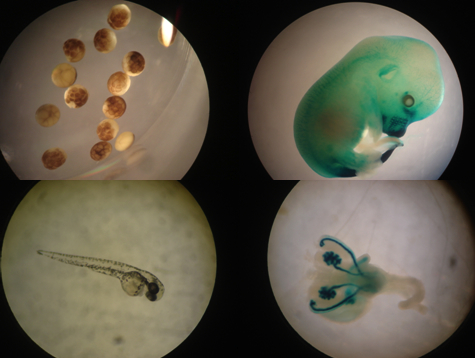UPMC/Curie Developmental Biology Course 2013
Posted by Lauren J. Tracey, on 29 November 2013
The 4th Annual UPMC / Curie International Course on Developmental Biology titled “From Stem Cells to Morphogenesis” took place in Paris during a 5-week period in September-October 2013. Participants included both Masters and PhD students coming from all over the world. Students from Brazil, Canada, Greece, Portugal, France, Germany, Spain, England, India, Russia and Italy gathered together to take part in this special course.
The course was comprised of two complementary components. The first part included the practical workshops on the development of different animal models including Drosophila, Mouse oocytes and embryos, Zebrafish, Xenopus, Chick and Nematode. The workshop took place at Université Pierre and Marie Curie (UPMC) every day (except Sunday) for three weeks. Professors and Assistant Professors from all over Paris directed us during a series of experiments aimed at exploring the different advantages of the model systems. We also had the opportunity to work together with prominent guest researchers from the Stowers Institute in Kansas and University College London (UCL). Throughout the workshop students were encouraged to ask questions and to discuss with the professors about the different techniques that can be used to study each model system. The high quality of our instructors combined with the availability of modern equipment at each bench and within the university provided appropriate conditions for us to acquire a thorough understanding of every model presented.
The practical workshop was followed by two weeks of scientific talks given by French and International speakers, and there was an option to only participate in this portion of the course. The conference took place at the Institut Curie, which is located in the historic and beautiful Latin Quarter of Paris. Professors and renowned researchers from institutions such as Harvard, Cambridge, the Stowers Institute, UCL, UPMC, Institute Pasteur and Institut Curie presented recent and often unpublished data spanning a variety of interesting topics in developmental biology in different model systems. Subjects ranged from planarian regeneration to Drosophila morphogenesis, and from regulation of cell cycle to embryonic stem cell biology. Each lecture was followed by an active panel discussion. We had the opportunity to ask the speakers, who are experts in their respective fields, questions about their subject and research. In addition, following the talks we had the chance to discuss with the speakers in a more informal way over coffee and biscuits about things like our own research and future careers. All of us would agree that this was a unique and beneficial opportunity.
Furthermore, students had the opportunity to present an article during the course chosen by the guest speaker and then to propose an experimental design for future research. The advantages of this exercise were bidirectional; we were able to present in front of the author of the article which gave us the opportunity to acquire constructive feedback and advance our scientific way of thinking. Likewise, the researchers benefited from the chance to listen to some new ideas and research proposals on their own work from a different perspective.
Overall, this course provided us with an excellent opportunity to broaden our knowledge and understanding of developmental biology in an ideal environment that promoted discussion, critical thinking and learning. We acquired many new theoretical as well as practical skills that will help develop our scientific careers. However the experience was not only academic. On a more personal level, we were exposured to not only to a different educational system, but also to new cultures. Lasting friendships were made between people all over the world. We were able to bond over our shared interests in developmental biology and in this way help to build a future network of young scientists. All in all this was an extremely rewarding experience.
Ioanna & Lauren



 (2 votes)
(2 votes)